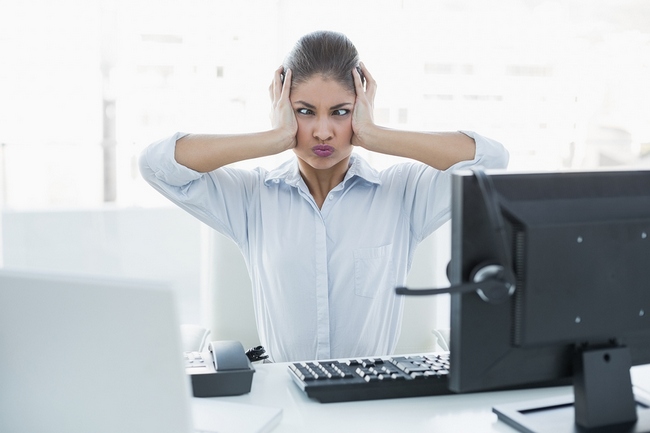- Make It Yourself Lavender Heart-Shaped Bath Bombs!
- 20 Things You Never Knew About “Down There”
- 12 Best Foods For Those Suffering From Arthritis Pain
- 12 Personal Hygiene Mistakes Almost Everyone Makes (Mom Never Told You About #4!)
- 15 Medicinal Plants And Herbs From The Cherokee People
- 12 Mind-Blowing Benefits Of Drinking Coconut Water During Pregnancy
- 12 Outstanding Winter Foods That Won’t Fatten You Up Like A Christmas Turkey
Sitting Too Long Leads to Multiple Mental Health Issues

Photo credit: bigstock
If you haven’t heard, there has been a lot of talk about recent scientific studies that show that sitting down for prolonged periods of time leads to a shorter lifespan as well as a variety of health problems. Spending a lot of time on your arse, such as watching television, using your cell phone, doing work at a desk, or using computers, can make a significant impact on the metabolic functioning of your body, add to your belly fat, your cardiovascular health, as well as have a negative impact on your mind.
Prolonged sitting increases your risk of insomnia, arthritis, heart attack, type 2 diabetes, and developing certain types of cancer and that’s not all. You can also increase your risk of dying younger than you should. Think you’re safe because you are fit and you exercise regularly? Nope, think again. You are still vulnerable even if you are as fit as any athlete.
It’s becoming more and more clear that movement, any kind of movement, is critical for our longevity and health, even more so than a regular exercise program. If you want to lower those risks mentioned above, you need to get up off your fanny and you need to do it fairly often. Science has shown that temporary vigorous exercise does not make up for the damage that happens from extensive time spent sitting.
Think of sitting as your brains worst enemy. Your brain is not much different from the rest of your body. It needs strong blood flow, optimal glucose and good oxygenation to work properly. When you are sitting, the skeletal muscle fibers in your body aren’t contracting, as they do when you are standing or walking about. Because of this, your body requires less fuel and the extra glucose begins to stack up in your bloodstream. This leads to diabetes, obesity, as well as other health problems.
Continue to Page 2

Photo credit: bigstock
The American Journal of Preventative Medicine published a study done in Australia that wanted to determine if lengthy sitting sessions had any effect on depression. Scientists analyzed the habits of about 9,000 women, all between the ages of 50 and 55, over several years’ time.
This study revealed that women who sat for 7 hours a day, or more, were found to have a 47 percent higher risk of depression that those who sat for less than 4 hours per day.
Women who did not participate in any physical exercise program at all had a 99 percent higher risk of developing depression than women who exercised, no matter how slight. These findings are super clear: sitting for long periods, especially when combined with a lack of exercise, can lead to depression. (At least among middle aged women) Find out how to naturally treat depression.
Other scientists have reached similar conclusions about the effects that too much time spent sitting eventually has on your mental health. Researchers in Britain also reviewed data from a national wellness project. They found that free time spent watching TV and using the computer were often associated with reduced feelings of well-being.
Another study, done in Australia, involved the work habits of more than 3,000 government workers. Those workers who spent more than 6 hours per day sitting on their butts were much more likely to score higher in terms of psychological distress than those who sat less than three hours per day, regardless of whom active they might be outside of their jobs.
Continue to Page 3
Why does simply sitting down have such a negative impact on your mental health? This might be related to the things we are actually doing when we are sitting. Most of us spend our time sitting down and watching mindless shows on the TV, or seemingly endless hours on the computer answering emails and text messages, surfing the internet, etc. We rarely do anything that would involve our minds and engage others face to face. Read more why you should turn off your Netflix and go to sleep.
The British did another study that involved more than 25,000 people who spend long hours working in front of a computer. Many of these subjects complained that they felt anxious, depressed, and had no desire to get up and go to work in the morning. This study found that working just 5 hours per day in front of a computer was enough to produce insomnia and depression in most people.
Although the computer is necessary for most children nowadays, allowing them to spend hour after hour on the computer, regardless if it’s video games or homework is not good for your child either. It’s a well-established fact that a lack of physical activity is the main force behind America’s childhood obesity epidemic. However, if your child spends hours in front of an electronic screen, their mental health can also be at risk. A study done in the UK showed that kids who spent more than 4 hours per day in front of a computer reported that they had much lower levels of wee-being than those who spent less time in front of these electronic screens. In fact, another UK study shows that spending a lot of time in front of computer screens had negative effects on how children saw themselves, their self-esteem levels, and reported happiness. Kids who spent just four hours a day playing computer games experienced more anxiety, and depression, as well as behavioral difficulties.
Todays’ lifestyle and work requirements, however, make it almost impossible to stop sitting or using computers. However, you can learn some great strategies to help counteract the effects of using your hiney too much. Dare we say it? Don’t take this news sitting down!
Continue to Page 4

Photo credit: bigstock
Getting up often and doing a few stretching exercises should help to stop the effects that sitting down causes. A rather reasonable goal is to get up every 15 minutes and move around a bit. It’s that simple. Of course, this is sometimes easier said than done, especially when you are involved in a project or are at one of those 3 hour meetings, but there are ways around this. One way is to set some type of alarm, perhaps your phone ( there are plenty of free apps for this if your phone doesn’t have an alarm) or you can use fitness bands that sound a tone to remind you get up and move. If you are at a meeting, you might try getting up at least every half hour and stretch your arms over your head. Should anyone say anything, you can tell them that studies show so much sitting isn’t good and that you just need to stretch your legs for a bit. It’s doubtful that anyone will object to that and you might find a great deal of your co-workers join you for a much needed stretch.
There are several great stretches you can do at your desk. Check out the video and see how easy these exercises can be. Doing just one of these exercises every 15 minutes will stop the damage that sitting can cause. The more often you get up off your behind the better so try to find reasons to stand up. Pace in your office, or do some stretching exercises while you are on the phone, or walk when you are using your cell phone. Go talk to that person on the next floor instead of sending an email to them, take the stairs instead of the elevator and walk down to the mail room instead of just dropping that letter in the outbox. All of these little things add up so be sure to find reasons to move throughout your day.
By the way, those standing desks are a good idea but they don’t go far enough. You need to do more than just stand up and then sit back down. If your desk allows you to stand and then pace or do other movements that will work, but simply standing up isn’t quite enough.
So the key here is to move it, move it, move it! Any way you can, as often as you can.
Video:
Video:
Sources:
Br J Sports Med February 18, 2014
Psychology Today March 20, 2014
American Journal of Preventive Medicine September 2013
Mental Health and Physical Activity June 2013
Psychology Today March 20, 2014

































